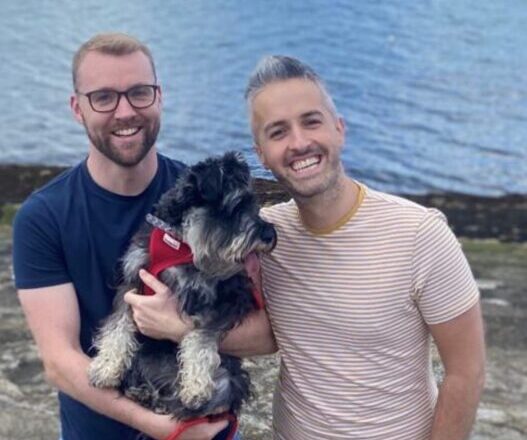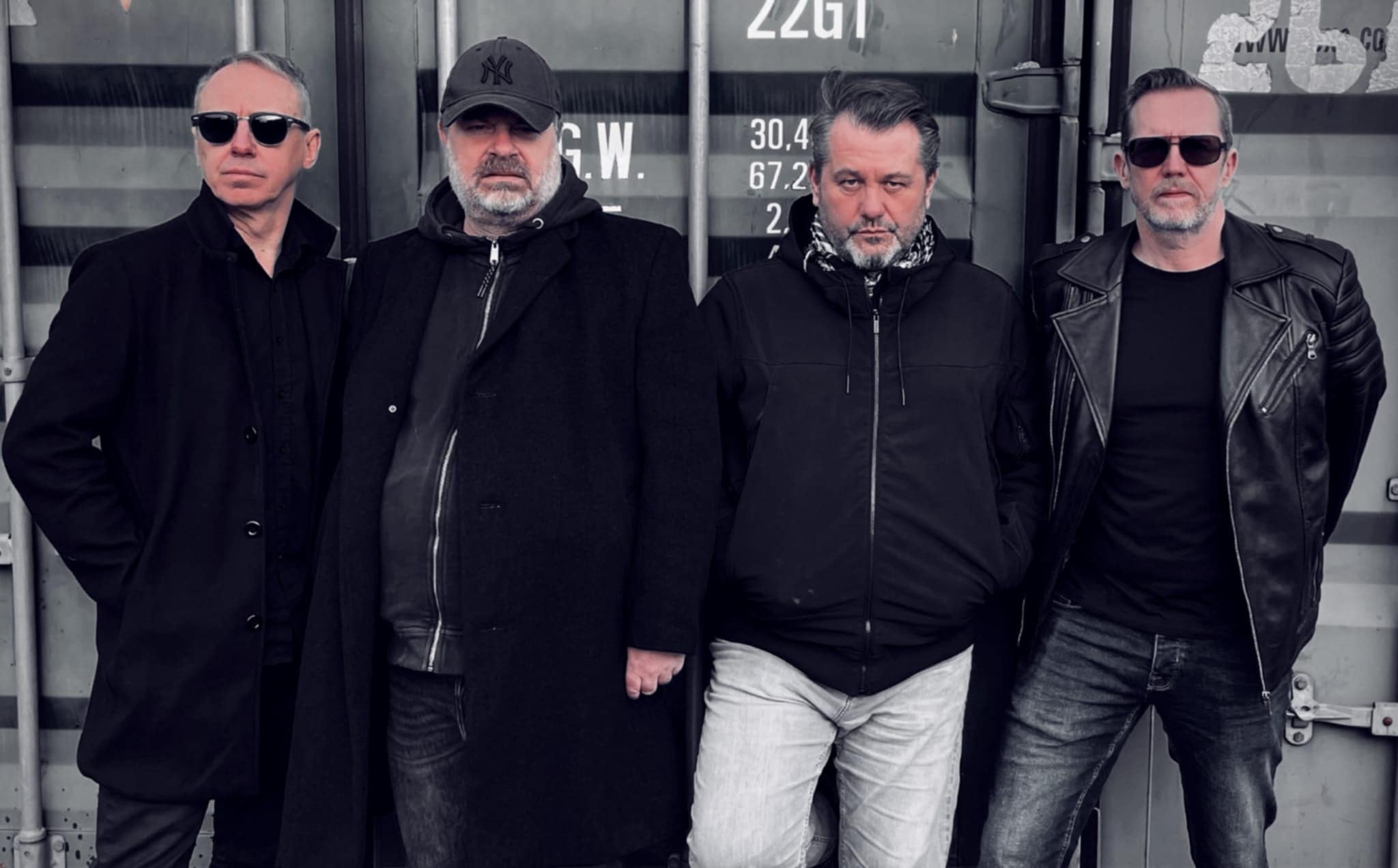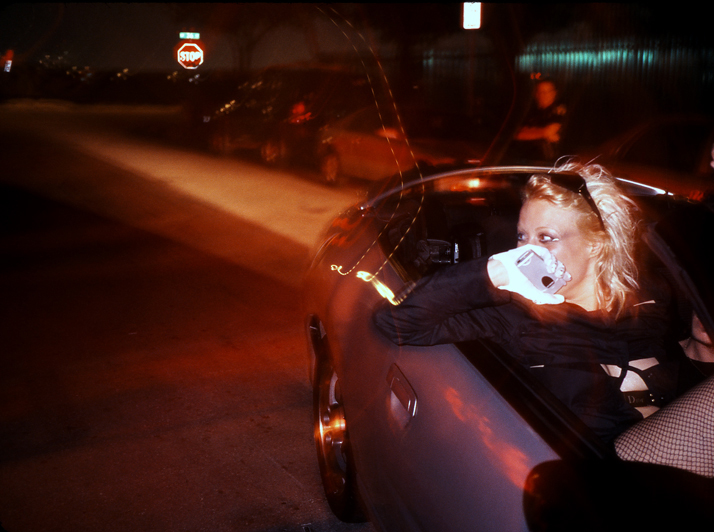(PHILADELPHIA) – Paul Phelan, head of commercial affairs at STEM healthcare, met his partner, Maitiú, in a “very unromantically way, in our local nightclub at the sound of Rihanna’s hit, ‘We Found Love in a Hopeless Place.’ It really was a hopeless place. It was like some hotel basement.” But that was 20 years ago. Today, they are getting ready for their August wedding in August followed by a honeymoon in Mexico. As he puts it, Phelan has been “one of the lucky ones” — his family and friends have been there for him. But for those who still struggle despite this last decade’s growth of social inclusion and acceptance, Phelan wants them to know that “it will get better.”
The Click interviewed Phelan to hear his ups and downs when coming out as a gay man in Ireland. Phelan, Maitiú, and their little German Schnauzer live on the outskirts of Dublin.
The Click: June is Pride Month. What does it mean to you?
Phelan: It’s very important, obviously, to recognize this month. The LGBTQ+ community benefits because we get to see how our allies support us, which is excellent, and obviously, there have been years when that wouldn’t have been the case. I’m from a different generation in terms of those people who have experienced significant adversity. I also come from Ireland, a very progressive country now, so we’re very lucky. On this day eight years ago, we voted by popular vote to legalize gay marriage — the first country in the world to do that. We saw an overwhelming response from the public, and so heartwarming. I remember sitting on the couch — we had bought our house the year before — watching the news. It was so emotional. We saw waves of people celebrating on the streets; there were parties everywhere. It was so exciting and so wonderful. Now, we just need to maintain that progression that we’ve experienced. We all have seen how things can regress — seen from the sort of social and political developments that we’ve had — so I think we need to keep that at the forefront because some still suffer and struggle to be who they are.
The Click: Ireland, a Catholic country, was the first to legalize gay marriage. I find that to be amazing. What is your thought on how the country was able to reconcile religion and gay rights?
Phelan: Ireland has a huge Catholic base, and years ago, that would have been really, really hard. But there has been a shift in Church versus State. We have gay people in high levels of government — see our prime minister — which would have been unheard of 20 years ago. Ireland has such a diverse population now — people coming from all different walks of life — and I think people are just much more willing and open. My parents are in their 60s, and there’s absolutely no issue with me being gay. They’re very proud. We’re getting married in two months, at the start of August, and it’s really, really exciting because both of our parents are insisting on inviting the cousins and the family members. The guest list is exploding. But I think it’s also a testament to them to say… God, they’re so proud. They’re delighted for us, and they want to support us in whatever they can do.
The Click: I am sure that coming out and saying “I am gay” is the culmination of a long, thoughtful, introspective process. What advice do you have for those who might still be struggling?
Phelan: There are many gay organizations and charities. I know PFLAG is a very big one in the US, where parents and friends come together to support the LGBTQ+ community. One of their mantras is that “it gets better,” which is completely true. I’ve been very lucky in my experiences because I didn’t have the difficulties that so many have. I know school can be a terrible time for gay people if they’re bullied or picked on, or they stand out, or they act a little bit differently. But the point is that it really does get better.
The Click: How so? What does it mean: “It gets better”?
Phelan: It’s very difficult to find yourself in society and understand where you want to go or what you want to be. Even when I think about myself and where I grew up in a very working-class area of Dublin, I didn’t really know any gay people; I didn’t know what my future would look like. I probably would have seen a few entertainers on TV and hairdressers, and that probably would have been the extent of what I thought was there for me from a career perspective. I think it’s true that if you can see it, you can achieve it. Having gay people in positions of power or authority or just having people there where you can see yourself in the future, as we have now gay politicians and gay public figures — people coming out in sports and film and TV and able to stand in their own skin — is very impressive. Even in my upbringing, probably the one difficult area was that I was always quite geeky, and I loved numbers! So then, trying to forge that into college and a career and stand in as me and progress up that career ladder, I had to rely on my own instincts and my own self-worth. So, what I would say is, “It will get better.”
The Click: My daughter is 16, and she also says her pronouns when she introduces herself. But it sounds natural. Kids today are learning and practicing that in school. But for me, it does not roll naturally. How does saying our pronouns make you feel?
Phelan: I understand that there can be difficulties as people try to navigate that understanding, and at the same time, I try and keep it as a practicality in terms of: does it really impact anyone else? If someone you know has a preference as to how they want to be referred to, then it only helps. I understand there are specific nuances around that. Like with sports — a lot is going on with women’s sports in the media, for example. I know that that is a challenge that needs to be overcome, it’s an ongoing process, but again I try and keep an open mind. It’s not something that impacts the vast majority of society’s daily lives, so live and let live. It’s great to see people have that certainty in themselves. I still struggle in terms of being as forthright about my being gay. I still have my “unproud” moments.
Question: You do? Tells us more about that.
Phelan: Only the other week, actually, I had a situation. We were going to a friend’s wedding, and both of us had left our suit jackets to be tailored in the local alterations place, and when I came in, the man said, “ Oh, your brother was in yesterday,” and I just said, “Oh yeah,” and walked out. Then, I was like: why didn’t I correct him? So maybe that’s some sort of internal bias I have or a protective barrier. I wasn’t comfortable saying to him that he’s not my brother — he’s my partner. It’s great to see that the younger people don’t even think about it. It doesn’t take a feather out of them now. They stand in who they are. It’s amazing, really, to see. Now that wasn’t a very proud moment, and it just made me think of why we have these sorts of events. This is why it’s so important to continue putting yourself front and center and having these months. These help us recognize the need to say to people there are different people in society, and it’s important that we respect and validate everyone.
The Click: Everyone has a story or a moment in time that helped shape us as we are today. Is there one that sticks out the most to you?
Phelan: The one that sticks out and is probably a lesson for families or parents of young gay children is when my parents found out that I was gay. My sister told them, and my dad came upstairs. I was getting ready to go out to college, and I was crying, and he said, “What are you crying for? Everything’s okay. Are you okay? Nothing has changed.” He then went back downstairs. He was going out to the office to work, and my mom said, “You can’t go out to the office — you know how Paul is after telling us this big news.” And my dad said, “Nothing has changed. Nothing is different. I’m doing what I do every day. I’m going to work.” I always hold on to that. That was a very cool thing to do, you know? My dad is a builder, kind of stereotypically masculine, and it just didn’t take a feather out of him. He was so supportive all along. That is a real moment of pride. That’s all I could really wish for other members of the LGBT community because it’s so important to have that kind of support network. If you don’t get it at home, you’ll meet friends that will become family and can be that for you in the future.


